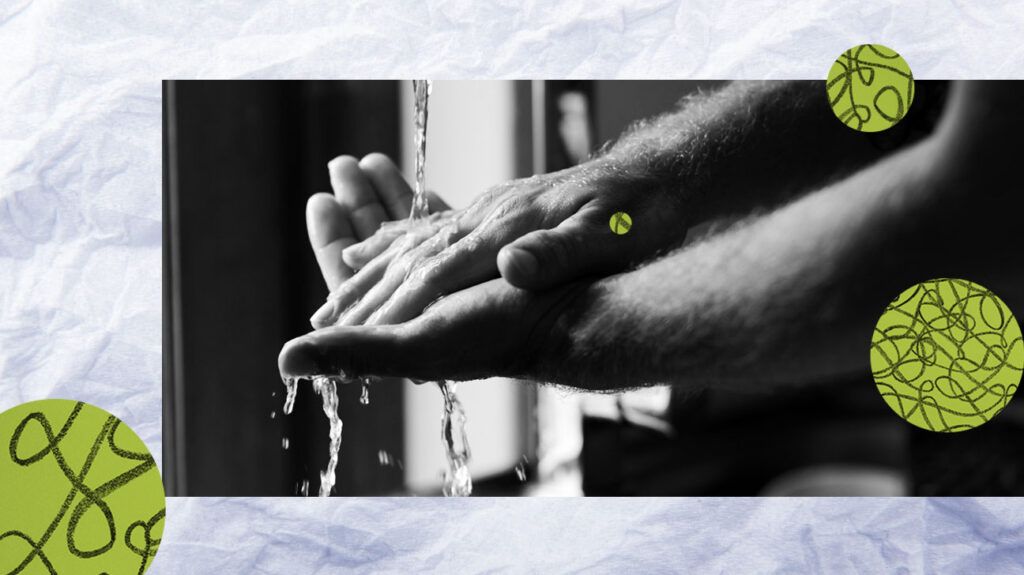Bacteria or viruses from feces may cause conjunctivitis if they come into contact with the eyes. Washing the hands regularly and before touching the eyes may help to prevent this.
Touching the eyes with unclean hands may transfer bacteria or viruses to the eyes, which can cause conjunctivitis.
This article discusses why feces can cause conjunctivitis and the symptoms a person may experience.
It also outlines treatment options and prevention methods for conjunctivitis.

According to the American Academy of Ophthalmology, bacteria from the anus can cause bacterial conjunctivitis if it comes into contact with the eye.
Touching the eyes after touching the anus or not washing the hands properly after using the toilet may lead to bacterial conjunctivitis.
Is it common?
Although bacteria in feces may cause conjunctivitis if they come into contact with the eyes, the American Optometric Association (AOA) states that the most common cause is staphylococcal or streptococcal bacteria from the skin or respiratory system.
Touching the eyes with unclean hands can cause bacterial conjunctivitis. Other causes of bacterial conjunctivitis include:
- physical contact with others
- insects
- using contaminated eye products, such as make-up or contact lenses
Contagious viruses with links to the common cold are the most common cause of viral conjunctivitis. Viruses may pass on to other people through sneezing or coughing.
A virus may also pass through a person’s own mucus membranes in the body, traveling from the respiratory tract to the eyes.
Allergens can also cause allergic conjunctivitis, which is more common in people with seasonal allergies.
Foreign bodies in the eye, such as wearing certain types of contact lenses, may also cause conjunctivitis.
If people touch their anus or come into contact with any bacteria in feces and then touch their eyes before washing their hands thoroughly, bacteria may transfer to the eyes.
Can poo particles from flatulence cause conjunctivitis?
There is no evidence to suggest poo particles from flatulence or farting on a pillow can cause conjunctivitis.
Flatulence occurs due to the release of intestinal gas through the anus and mostly consists of gases such as oxygen, nitrogen, carbon dioxide, hydrogen, and methane. Hydrogen sulfide can cause the odor of flatulence.
Can you get conjunctivitis from feces in a pool?
Feces
People must avoid swimming pools if they have conjunctivitis to help prevent passing it on to others.
Symptoms of conjunctivitis include:
- the white of the eye looks pink or red
- swelling of the eyes or eyelids
- watery or teary eyes
- irritation, a sensation of something being in the eye, or feeling the need to rub the eye
- itching or burning sensation
- discharge, such as pus or mucus
Antibiotic ointment or eyedrops can treat bacterial conjunctivitis. The AOA states that, with treatment, symptoms may improve within 3 to 4 days. Taking the full course of antibiotics is important to prevent the infection from recurring.
There is no treatment for viral conjunctivitis, as antibiotics do not work on viruses. It usually resolves by itself within 2 to 3 weeks.
People can help relieve symptoms with home treatments, such as applying artificial tears to the eyes and applying a clean, cool compress to closed eyes.
In severe cases, a doctor may prescribe topical steroid drops to reduce inflammation for viral conjunctivitis or antihistamines for allergic conjunctivitis.
To help prevent conjunctivitis from feces, it is important to always wash the hands thoroughly with antibacterial soap and water after using the toilet or touching the anus before touching the eyes.
Other steps to help prevent conjunctivitis
- washing the hands regularly with soap and water for a minimum of 20 seconds, or if this is not available, using a hand sanitizer with at least 60% alcohol
- washing the hands before and after touching the eyes or applying any eyedrops or medication
- avoiding touching or rubbing the eyes with unclean hands
- using a separate eyedrop bottle for an infected and noninfected eye
- using a clean washcloth or fresh cotton wool to clean the eyes
- making sure contact lenses are clean and avoiding sharing with others
- avoiding sharing personal items with others, such as make-up and washcloths
People may be able to treat conjunctivitis at home with good hygiene practices, cold compresses, and over-the-counter artificial tears.
A person will need to contact a doctor if they have conjunctivitis and
- eye pain
- blurred vision that remains after clearing any discharge from the eyes
- sensitivity to light
- intense redness of the eyes
- symptoms that are not improving or worsening
- a weakened immune system
- bacterial conjunctivitis that is not improving after 24 hours of taking antibiotics
Individuals should contact a doctor immediately if a newborn has conjunctivitis, as it can be serious without treatment.
Can bad hygiene cause conjunctivitis?
Poor hygiene, such as touching the eyes with unclean hands, may cause conjunctivitis. Regular handwashing with soap and water can help to prevent this.
Can being run down give you conjunctivitis?
People with a low immune system may be more prone to infections.
Conjunctivitis can occur with respiratory infections, such as the common cold. If people are unwell with a bacterial or viral infection, it may pass through the body to the eyes.
What is the most common cause of conjunctivitis?
Viral conjunctivitis is the
Touching the eyes after touching the anus or not washing the hands after using the toilet may transfer bacteria to the eyes and cause conjunctivitis.
Conjunctivitis can also occur through contaminated eye products, respiratory illnesses, and allergens.
Practicing good hygiene and regular handwashing may help to prevent conjunctivitis.
Although a person can treat conjunctivitis at home, they should contact a doctor if symptoms are severe or persistent.
